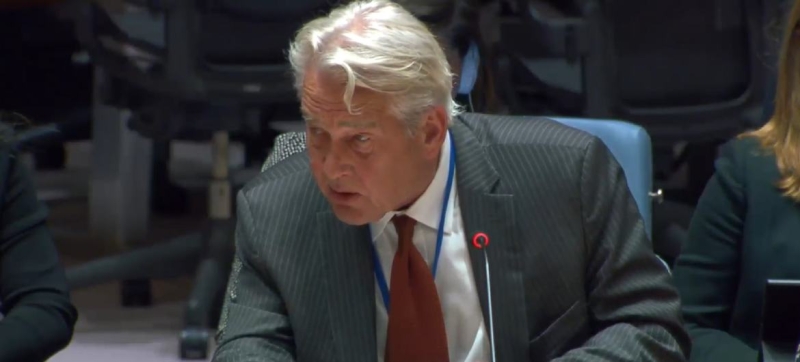
UN Special Coordinator for the Middle East Peace Process Thor Wennesland The Security Council heard a report on Israeli settlement activities in the occupied Palestinian territories International law
Israel continues to expand settlements in the occupied Palestinian territories, despite a 2016 Security Council resolution calling for an end to such activities. This was stated by Thor Wennesland, the UN Special Coordinator for the Middle East Peace Process, while presenting the 31st report of the UN Secretary-General on the implementation of the resolution.
The threat of regional escalation
He began his speech by warning of the growing risk of a large-scale regional escalation in the Middle East. “A series of explosions across Lebanon and rocket attacks on Israel in recent days have increased instability,” Wennesland stressed, calling on the parties to the conflict not to aggravate the situation.
Resolution 2334
Returning to the topic of today’s meeting, he noted that Security Council resolution 2334 (2016) calls on Israel “to cease immediately and completely all settlement activity in the Occupied Palestinian Territory, including East Jerusalem” and “to fully comply with all its legal obligations in this regard.” “Nevertheless, settlement activity continues,” Wennesland emphasized.
The 31st report of the UN Secretary-General on the implementation of the resolution covers the period from 11 June to 11 September 2024.
Settlement expansion
A total of some 6,370 housing units were built or approved in settlements in the occupied West Bank, including East Jerusalem, during the reporting period. Of these, 5,840 units were in Area C, including three outposts legalized under Israeli law, and nearly 530 housing units were built in the Gilo settlement in East Jerusalem.
Tenders have been issued for the construction of approximately 1,100 settlement housing units, including 780 in East Jerusalem.
On July 18, the Israel Defense Forces (IDF) Central Command signed a military order amending the 1995 document implementing the Oslo Accords to grant the military command planning and construction authority in parts of Area B that were transferred to the Palestinian Authority.
Demolition of Palestinian Homes
The report said demolitions and seizures of Palestinian-owned structures continued throughout the occupied West Bank, including East Jerusalem. “Citing a lack of Israeli-issued building permits, which Palestinians have virtually no access to, Israeli authorities demolished, seized or forced people to demolish 373 structures, forcing 553 people to flee their homes, including 247 children. Of these, 26 were funded by donors,” Thor Wennesland said.
Evictions of Palestinians from their homes in East Jerusalem also continued, he said. On August 15, Israeli security forces evicted the Shehadeh family from their home in Silwan in favor of a settler organization, according to the Supreme Court ruling, forcing 35 Palestinians to flee their homes.
Forced Displacement
One hundred eighty-eight Palestinians, including 111 children, have fled their communities in the occupied West Bank, citing settler violence and harassment and shrinking grazing lands.
International Court of Justice Ruling
On 19 July 2024, the International Court of Justice delivered an advisory opinion on the legal consequences arising from Israeli policies and practices in the Occupied Palestinian Territory, including East Jerusalem. In its findings, the Court confirmed that “the Israeli settlements in the West Bank and East Jerusalem and the associated regime have been established and maintained in violation of international law.”
The Court concluded, inter alia, that it considered that “the State of Israel is obliged to cease immediately all new settlement activity and to evacuate all settlers from the Occupied Palestinian Territory.” It stated that “the continued presence of the State of Israel in the Occupied Palestinian Territory is illegal” and that other States are obliged not to recognize as lawful the situation created by the illegal presence of the State of Israel in the Occupied Palestinian Territory.
Violence in Gaza
In Gaza, at least 3,920 Palestinians were killed and at least 10,197 were injured between June 11 and September 11, according to the Gaza Ministry of Health. Thus, since October 7, more than 41,084 Palestinians have been killed, most of them reportedly women and children, according to the Health Ministry.
According to Israeli sources, 101 of the 251 hostages kidnapped on October 7 are still being held captive. On September 1, the IDF found the bodies of six hostages killed by Palestinian armed groups in Gaza, including two women. In other operations, the bodies of 12 more hostages were found, and one hostage was rescued. Israeli sources also report that Hamas and other Palestinian armed groups have killed more than 1,580 Israelis and foreigners since October 7, including at least 338 women and 40 children.
Hamas and other Palestinian armed groups continued to hold hostages in appalling conditions, attack Israeli forces, and indiscriminately fire rockets into Israel.
Israeli operations continued across Gaza, forcing hundreds of thousands of Palestinians to flee their homes. Attacks on schools and airstrikes on densely populated areas also continued.
Report of the UN Secretary-General
The report emphasizes that the UN Secretary-General strongly condemns the attacks by Hamas and other Palestinian armed groups on Israel on October 7, 2023, as well as the mass killings and injuries of civilians in Gaza. The UN chief demands that Israel fully open all crossings into Gaza and facilitate the unimpeded delivery of humanitarian aid to the Palestinian civilian population.
The secretary-general also calls for an immediate ceasefire in Gaza to end human suffering and the unconditional release of all hostages.
He also expresses deep concern over the continued expansion of Israeli settlements in the occupied West Bank, including East Jerusalem.
